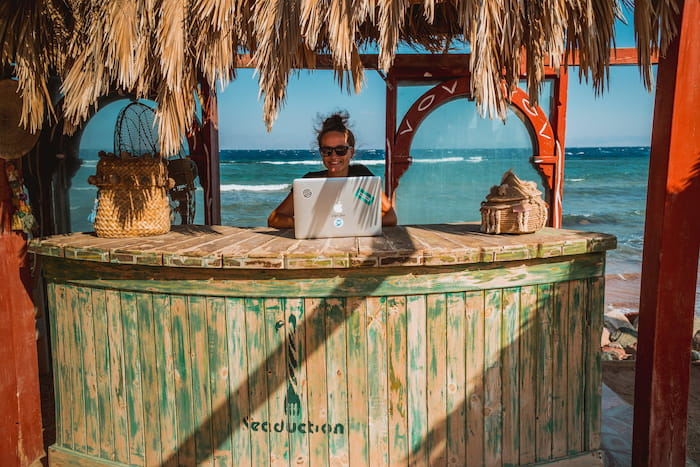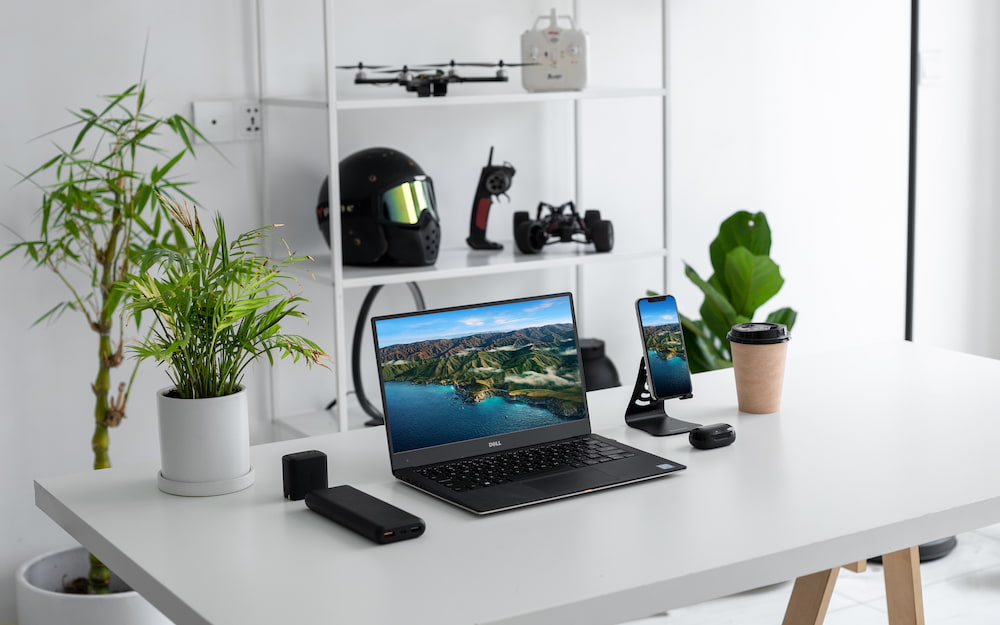Digital Nomads: 9 Critical Tips for Blending Work & Travel
.jpg?sfvrsn=74646b30_0)
For digital nomads, combining travel and work is the only way to go.
What are digital nomads, you may ask?
Imagine the biggest worry of your workday is getting the sand out of your keyboard or making sure your swim trunks aren’t visible on your video call.
Digital nomads don’t toil in a traditional office setting. They rely on technology to connect to coworkers and clients, projects and presentations, bosses and boardrooms, from wherever the mood strikes them—and wherever the Wi-Fi is strong.
No longer tethered to a location, digital nomads are taking advantage of RVs and campers, short-term vacation rentals, hotels and hostels—even other people's couches—to get the job done from 9 to 5 and explore new locales the rest of the time.

Questions to Ask Ahead of Time
Do you think that being a digital nomad sounds like an appealing lifestyle? We’re all for it! Get out there and explore the U.S. (or anywhere, really) and get some work done!
Keep in mind that there are several factors you should take into account before you sell the house and hit the road. Some of the important questions are as follows:
- Will your company allow it?
- Do you have the proper equipment?
- Are you traveling internationally?
- Will you be getting mail?
- How do you stay in touch?
- Where’s the money?
- What are your lodging options?
- How are you going to organize your workdays?
- Have you rented self-storage?
The Pandemic’s ‘Silver Lining’
If the global COVID-19 pandemic has taught us anything, it’s that the working world has changed. Remember when you had to beg management to work from home one day a month? You know, back in 2019.
Then the pandemic hit and forced many businesses to close their offices at least temporarily. Suddenly, an entire digital workforce was waking up five minutes before they clocked in, hopping on Zoom calls wearing dress shirts and pajama bottoms, hoping their cat didn't walk across their keyboard.
About that time, enterprising businesses realized they could ditch their brick-and-mortar locations (and the associated costs) and just have their employees commute remotely forever.
At the same time, savvy employees realized that they didn’t need to be “at home” to do their job, just somewhere with a stable internet connection.
Even with COVID protocols, the allure of working from the beach or the mountains suddenly became more appealing than working from an apartment in an urban area that was locked down.
10.9 million workers described themselves as “digital nomads” in 2020, an increase of 49% in just three years—Harvard Business Review
Learn the essential tips and tricks to begin your digital nomad lifestyle and make it as trouble-free as possible.
8 Tips & Considerations for Digital Nomads
1. Your company must agree
The digital nomad life was once the realm of freelancers who could set their own rules. But as an FTE, you’re still beholden to your company’s rules and regulations. Make sure your company is willing to allow you to work remotely, by checking with your HR representative and your immediate supervisor.
Zoila Streich, an avid digital nomad and co-founder of Independent Fashion Bloggers, provided us with this insight.
"Make sure you tell where you are going to be, the timezone, and the number of hours you will be working, so you won’t be surprised with phone calls or meetings at nonsense hours. But, have in mind that sometimes you will have to attend some meetings during the night."
Pro tip: Keep an accurate log of your working hours so your productivity is never questioned.

2. Get the right equipment and consider your wifi connection
A powerful laptop, a reliable internet connection, and a docking station are must-haves. It’s also a good idea to have an unlimited data plan and a hotspot on your cell phone. Make sure you have power adapters and international cell phone coverage if traveling abroad.
Alex Davis, co-creator of the the couples wellness and lifestyle site Ryan and Alex Duo Life knows the pain of poor wifi while traveling. She told us:
"Our rude awakening came when we left our home office in Texas with a wifi speed of 1000 Mbps (megabits per second) and arrived in Bariloche, Argentina with a wifi speed of 2 Mbps. Typically, our work running our website requires wifi speeds of at least 20 Mbps for a download. Test your wifi speed with a site like Xfinity xFi Speed Test and upgrade if needed. It will save serious headaches later when poor wifi causes lost work."
Torben Lonne, co-founder of DiveIn, provided us with this unusual, yet crafty tip for getting better wifi reception while working in an area with poor reception.
One hack to ensure that your laptop is getting the best possible wi-fi reception is improving the network signal. The best way to do this is to buy a USB wi-fi adapter, which usually doesn't cost more than $20 for a decent one. Then what you need is an empty Pringles can, where you will carve a small hole to fit the USB wi-fi adapter. You will need a USB extension cord since you need don't want to work on your laptop sideways. Lastly, tape the USB wi-fi receiver so that the antenna is pointing through and inside the can.
Pro tip: Plan for the worse. Find out where the nearby coffee shops and public libraries are, just in case your internet goes down.
3. Passports and vaccines
Digital nomads don’t just travel the United States. If you’re planning on traveling outside the country, you’ll need a passport as well as a host of vaccines (not just COVID). Don’t forget the time differences if you’re obligated to be on client calls!
Pro tip: Check international travel restrictions online with the U.S. Department of State.
4. Mail and packages
Sign up for a service such as Traveling Mailbox to get your snail mail delivered digitally, and take advantage of drop-shipping services to get packages.
Pro tip: Many retail businesses will allow you to purchase online, then pick up in the store of your choice, such as Amazon Hub Lockers.
5. Make your travel plans known
Make sure co-workers and family or friends know when and where you’re traveling and check in often (especially with work—you’re still responsible for 40 hours a week!).
Pro tip: If you’re leaving a house or apartment unoccupied, resist the temptation to post your current location or travel plans on social media. Save those pictures and descriptions until you return home.
Bonus tip: List your house or apartment on a long-term rental site while you’re gone. You’ll need to hire a recurring cleaning service, but it’s a great way to recoup some of your travel expenses and get someone to water your plants!
6. Money talks
Make sure you have access to your money wherever you are. In addition to cash, make sure you have a credit card (for emergencies), and digital accounts, like Venmo or PayPal.
Pro tip: Don’t forget about paying your bills. Sign up for email or text notifications and use direct deposit and autopay whenever possible.
7. Where to stay
Where you stay depends largely on what you want your adventure to be. Beach houses, campsites, cabins, urban settings—it’s up to you. Long- and short-term rentals can be made virtually anywhere, thanks to booking services like VRBO and Airbnb. Just make sure you’ve got a good internet connection!
Pro tip: Reservations can be made in National Parks up to six months in advance.
8. Organize Your Day
The digital nomad lifestyle is less-structured than a typical office environment. That's why it's crucial to plan your day and maximize your effectiveness.
Kevin Mercier is a professional travel blogger at Kevmrc.com with a great deal of experience when it comes to the "Work from Anywhere" lifestyle. He shared his opinions on the importance of planning your day in chunks.
I always made sure to set all calls for either morning or afternoon to plan the works day space accordingly. I liked cafes for focused work and co-working spaces with a proper fast internet connection for calls a bit more.
Nikki Webster of Brit on the Move, sent us a tip from a beach house on the west coast of Florida regarding the importance of organization.
Maintain your typical schedule. I read about people touting work anytime. It can be done; I've done it. But a schedule is key to productivity, and if you neglect to follow the one, you will eventually lapse.
9. Self-storage is a must-have
Self-storage offers a secure place to store everything you won’t be traveling with. Storage units are less expensive than renting an apartment and have multiple security features to keep your possessions safe. Climate-controlled storage can help mitigate damage from humidity, too.
Pro tip: Many self-storage facilities offer car storage for vehicles you might be leaving behind.

What’s next for Digital Nomads?
Are you ready to adopt the WFA (working from anywhere) lifestyle? You may not have the chance again, so take advantage while you can.
Danielle Hu of The Wanderlover Podcast put it beautifully when she told us:
After traveling to 60+ countries and working remotely for the past 4 years, I’ve learned that media, blogs, and opinions on a destination are ALWAYS different from real-life experiences. They have the power to shape your view on a certain part of the world, but you need to take it with a grain of salt. You should never base your decision to travel or not travel somewhere based on one person’s opinion. If it’s calling your name, go see it for yourself and you’ll always be glad you listened to your gut.
While you’re working out the details, don’t forget to rent a storage unit from Store Space. We’ll help keep your possessions safe while you’re traveling. Use our storage location finder to locate the facility nearest you!






